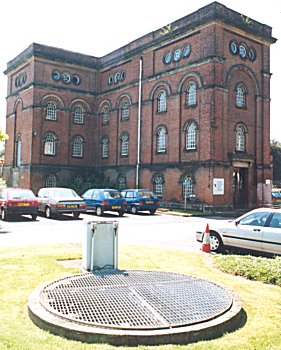|
The Public Health Act
The General Board of Health was established in 1848 by the Public
Health Act of that year. Local Boards of Health were set up throughout
the country, either by the General Board or by local elections after a
petition to the Board by one tenth of a town’s ratepayers. A petition
was sent to the Board by the newly formed Wolverhampton Corporation and
Robert Rawlinson, the Board’s Chief Inspector was sent to report on
sanitary conditions in the Wolverhampton area. His enquiry’s began on 5th
February 1849 and his final report was 54 pages long. He noted the
overcrowding and had this to say about Canal Street (now Broad Street):
"Many of the poor take in lodgers, and have three beds in one room –
father, mother, lodgers and children crowded together. Among the
colliers there is frequently a night and day shift, and they use the
same bed.
|
|

Tettenhall Pumping Station and a borehole.
|
This overcrowding generally produces fever, smallpox, and other
contagious diseases, and spreads them through a whole district."
This is what he had to say about the water supply and sewage:
"The general construction of the privies and ash pits in the poorer
parts of the town are open tanks, or receptacles for the soil, which is
afterwards covered over until full with fire ashes and other refuse. In
very many instances the privies have been built over the ancient ditches
or water courses, leaving their contents openly exposed until some heavy
falls of rain shall wash away the same, and where such is the case we
seldom find any ashpits at all; the consequence is that an accumulation
of ashes etc. finds its way into the same reservoir, and the whole
becomes a mass of stagnated corruption."
|
|
Rawlinson also reported that:
There was "an entire absence of main sewers or leading lines of
outlet, and this renders ineffective such drains and sewers as might
otherwise be considered useful"…
He stated that the general feeling of the Town Council of
Wolverhampton and the ratepayers of the district was strongly in favour
of the Public Health Act.
The report was completed in 1849 and stated that Wolverhampton was an
unhealthy place to live. It contained many recommendations, one of which
was "that a full and constant supply of pure water should be laid on at
every house, and that there should be a system of sewers and drains,
properly arranged and taken into every house, back street, court, yard
and alley."
The outcome
|
|
The Town Council quickly adopted the Public Health Act in October
1848 but it took nearly twenty years before a proper drainage system was
built. The water supply was still inadequate for the town’s needs and
the water from the ex-colliery site on the Rough Hills was not suitable
for consumption. In 1853, Dr. Peter Bell, a local medical man, sent a
letter to Mr. Jeremiah Wynn the Lord Mayor, complaining about the state
of the water that was drawn from the Rough Hills site. The following is
an extract:
|

The Manager's House at Tettenhall Pumping
Station.
|
|
"Sir, Permit me to address you, as the Mayor of this Borough and
Chairman of the Local Board of Health, on a subject at the present
moment of the deepest import to the inhabitants. I refer to the supply
of water to the town by the Waterworks Co., taken in part from a pit in
a neighbouring coalfield. Without dwelling on the fact that the use of
pure water is safer at all times than impure, especially when the vital
principle is lowered by some epidemic, or on the probability that water
that has issued from the strata of a coalpit partakes more or less of a
character of marsh water, to the unwholesomeness of which the medical
statistics of the British Army have often painfully testified, there are
some facts connected with the progress of cholera in the neighbourhood
during the two former epidemics that are, in my opinion, worthy of
serious consideration. In 1832 Bilston, Ettingshall Lane, and the
Willenhall Roads were the seats of cholera’s most terrific ravages. I
believe that all these places were at that time supplied entirely by
water taken from the coalfields on which they severally stand. Further,
in 1849, the date of cholera's last appearance, these identical places,
with the exception of Ettingshall Lane, which had been raised to the
ground, were the spots on and around which the disease raged with the
greatest malignity…
I name these circumstances in order that all reasonable precautions
may be taken to avoid anything that has proved to be so inimical to
human life during two separate outbreaks of malignant cholera; in short,
to pump into Wolverhampton the water raised from a shaft in a coalfield,
and thereby put ourselves-as to water supply-in the same condition as
our neighbours, who have suffered so awfully from a foe that has again
invaded our shores."
|
 |
|

|
|

|
Return to
the
Water Works Company |
|
Return to
the beginning |
|
Proceed to
An
Unfortunate Episode |
|